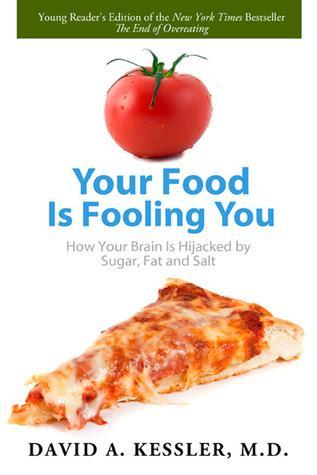Book: Your Food is Fooling You: How Your Brain is Hijacked by Sugar, Fat, and Salt by David A. Kessler, adapted by Richie Chevat
Genre: Nonfiction for teens
Publisher: Roaring Brook Press
Publication date: 2013
Pages: 173
Source: Library

In my opinion, this isn’t just for young readers
Summary: Your Food is Fooling You explores the implications of this discovery by the author, former FDA Commissioner, David A. Kessler:
I’m sure you’ve heard that junk food or fast food is bad for you. Maybe you’ve heard that it has too many calories, too much fat. You may know that fast food doesn’t give you the right mix of proteins, fat, and carbohydrates your body needs to be healthy. But there’s one thing I bet you haven’t heard before.
These kinds of foods make us fat because they make us want to eat more. These processed foods, loaded with sugar, fat, and salt, make it almost impossible for some people to stop eating. (p. 14)
Thoughts: This book is marketed as the “Young Reader’s Edition of the New York Times Bestseller The End of Overeating.” That description doesn’t capture what an overhaul this is of the first book. Call it the “Stream-lined, Quotable, Quickly-Read Edition of The End of Overeating for Everyone.” Unless you need details of studies to be convinced that our modern food system is broken in significant ways, Your Food is Fooling You may be a better version for many readers.

The book that started me on my 70-pound weight loss journey
The End of Overeating was the book that started me on a successful journey to lose 70 pounds (and the first of the 70 healthy lifestyle books I read while on that journey). I loved reading Your Food is Fooling You to remind me of all that I learned. I especially like that it has great quotes to share, something that was lacking in the more complicated writing style of the The End of Overeating.
Our brains were designed to encourage us to seek out the extra energy in fat and sugar, a vital skill when food was scarce. There’s a balancing process in the brain that gets us to stop looking for food when we have enough — no point in wasting that energy. But there are things that throw off that balance. Highly stimulative food with excess sugar, fat, and salt messes with our reward system in the same way as cocaine. It’s not a matter of willpower; it’s a result of brain chemistry.
Every time I think I’ve got this figured out, I hear of a new trick by the food industry. If you were at Chili’s and wanted a reasonably healthy meal, would you go for the Kickin’ Jack Nachos, the Boneless Shanghai Wings, or the Margarita Grilled Chicken? If you picked the last, like I did, you might want to read this description of how it’s made:
At the factory, the uncooked chicken had been soaked in a liquid that included sugar, two kinds of oil, and salt. Then it was frozen and shipped to the restaurant in twenty-five-pound bags, each containing about fifty pieces of meat.
Nick Nickelson is a scientist at a company that sells meat to Chili’s. He told me that the chicken and sauce were tumbled together in a piece of equipment that resembled a cement mixer. This pulls the liquid into the meat, making it tender and easier to chew. Another common method is to shoot the sauce into the meat with hundreds of needles. This tears the meat, basically making it “pre-chewed.” (p. 64)
Suddenly, I’m appreciating my husband’s barbecue skills, because I think I’ll stay home for grilled chicken from now on.
Both Your Food is Fooling You and The End of Overeating stirred up the same frustration in me. Three-fourths of the book describes the situation in detail. The last part on how to address the problem seems inadequate – just you and me and this book against a hydra-headed food industrial complex.
The answer is to break the patterns that lead to overeating. This is not easy, but it can be done. Overeaters have to change their conditioning and what they want, and retrain their brains. We have to create new habits that lead to healthy eating. (p. 128)
For me, it took 70 books, Cognitive Behavioral Therapy techniques (I learned them from Judith Beck’s books The Beck Diet Solution and The Complete Beck Diet for Life), and daily accountability posts on 3 Fat Chicks. I’m finally winning this game.
You might think of all this as a game against a powerful opponent. You’re not going to win every point. It will take a few rounds until you figure out your winning moves. You’ll need a game plan. That means you have to think before every meal, and when you run into food cues during the day. What are you going to eat and how are you going to eat it? After a while your game plan will become more automatic. You won’t have to think so much about your response to food. It will become your new habit. (p. 159)
Appeal: If you overeat in America, or any place where capitalism has spread the American way of eating, you need this book.
 Challenges: Your Food is Fooling You is the first of 9 books I intend to read for the Foodies Read 2014 Challenge.
Challenges: Your Food is Fooling You is the first of 9 books I intend to read for the Foodies Read 2014 Challenge.
This is my post for Weekend Cooking. Check out Beth Fish Reads for more food and cooking posts.
Do you struggle with overeating in our current environment? Are you old enough to remember when bookstores didn’t sell candy? When pharmacies didn’t sell potato chips? When gas stations put off an unappetizing aroma of motor oil instead an alluring whiff of grilled hot dog?

